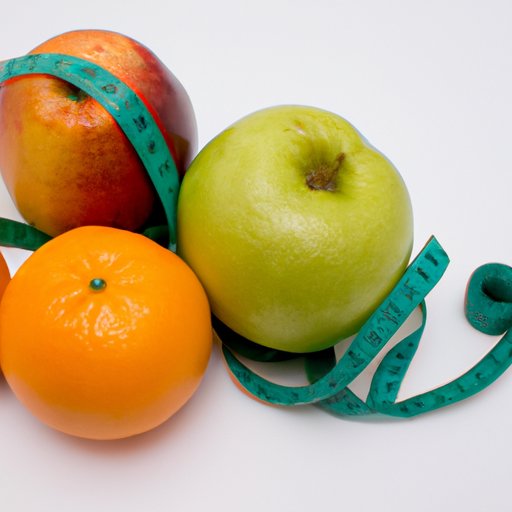
Introduction
Fruit has long been touted as an essential part of a healthy diet, but there’s an ongoing debate about whether fruit can make you gain weight. Some people worry that fruit’s natural sugar content will cause unwanted weight gain, while others argue that fruit is an ideal snack for anyone looking to maintain a healthy weight. In this article, we’ll dive into the research and explore what science says about the relationship between fruit and weight gain.
The Truth about Fruit and Weight Gain: Separating Fact from Fiction
Many myths circulate about how fruit can affect your weight, but not all of them are true. Let’s take a look at some of the most common misconceptions and the facts about fruit and weight gain.
Can Eating Too Much Fruit Make You Gain Weight? The Surprising Answer
It’s easy to assume that eating too much fruit can lead to weight gain. After all, fruits contain natural sugar, and too much sugar can spike insulin levels and cause weight gain. However, the reality isn’t so simple. Eating large amounts of any food can cause you to gain weight, not just fruit. As long as you’re mindful of your overall caloric intake, eating fruit in moderation won’t make you gain weight.

Why Fruits Are Not the Culprit for Weight Gain: Debunking the Myths
One of the most common myths about fruit and weight gain is that fruit is “fattening.” However, research indicates that people who eat fruit are generally healthier than those who don’t. Fruits are low in calories and high in fiber, which helps you feel full for longer. Plus, most fruits contain important vitamins and nutrients that are essential for good health.
The Fruit Dilemma: How to Incorporate Fruit into Your Diet without Gaining Weight
If you’re looking for ways to incorporate fruit into your diet without gaining weight, there are several strategies to consider. For starters, focus on consuming whole fruits rather than fruit juice, which can be high in sugar. You may also want to limit your intake of high-calorie fruits like bananas and grapes and opt for lower calorie options like berries. Or, try incorporating fruit into meals rather than eating it as a snack.
From Fears to Facts: Understanding the Relationship Between Fruit and Weight Gain
The key to making smart choices about fruit and weight gain is to understand your own body’s needs and limits. Keep in mind that everyone’s body is different, and what works for one person may not work for another. Be mindful of your overall diet and calorie intake, and aim for balance and moderation in all your food choices.
What the Experts Say: Fruit and its Impact on Your Weight
According to nutrition experts, fruit can be a healthy addition to any diet, even if you’re trying to maintain a healthy weight. Eating a diet rich in fruit has been linked to lower rates of obesity and other health problems. At the same time, it’s important to be mindful of the overall caloric content of your diet and to focus on whole, unprocessed foods whenever possible.
5 Strategies for Including Fruit in Your Diet While Maintaining Your Healthy Weight
Here are five practical strategies for incorporating fruit into your diet while keeping your weight in check:
- Choose whole fruits over fruit juice
- Avoid high-calorie fruits like bananas and grapes
- Opt for lower calorie fruits like berries and apples
- Incorporate fruit into meals rather than snacking on it throughout the day
- Keep portions in check and be mindful of overall calorie intake
Conclusion
The bottom line is that fruit doesn’t have to make you gain weight, but it’s important to be smart about how you incorporate it into your diet. By focusing on whole, unprocessed fruits and being mindful of your overall calorie intake, you can enjoy all the health benefits that fruit has to offer while maintaining a healthy weight.




